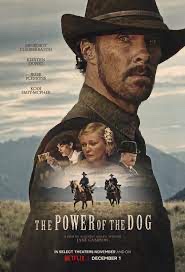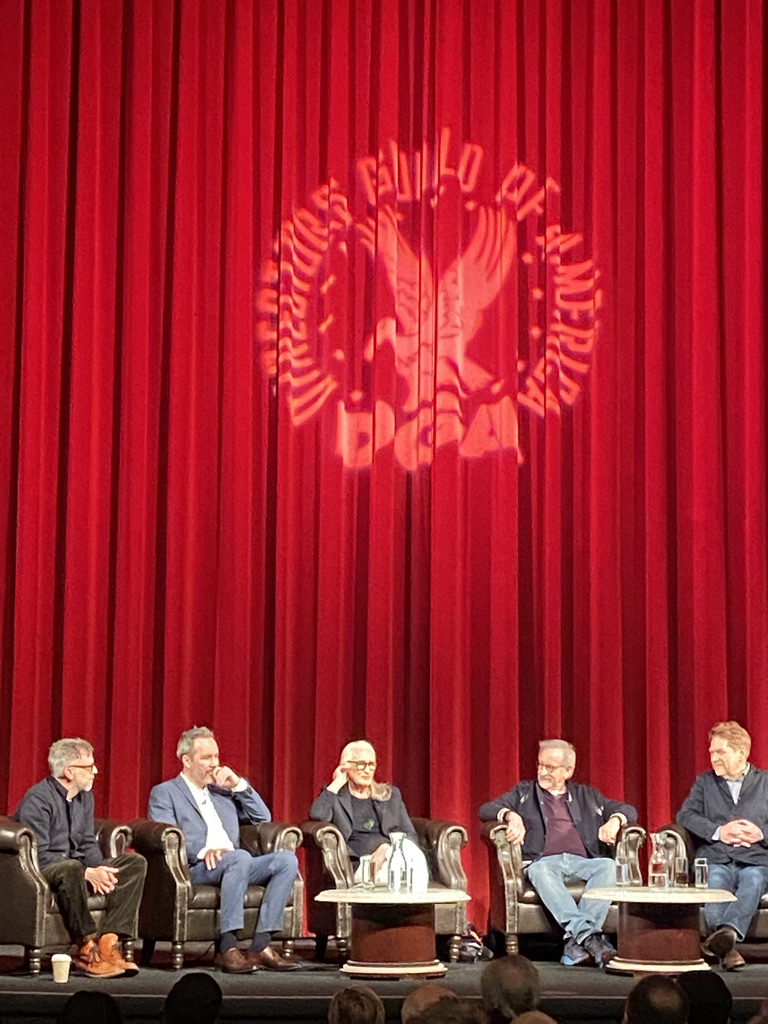I dream for a living. --Steven Spielberg
Thanks to my son, director/editor Ishai Setton, I was privileged to attend the all-star lineup at the DGA's roundtable with the five directors nominated for the 2022 Director's Guild of America Award: Paul Thomas Anderson, Denis Villeneuve, Jane Campion, Steven Spielberg, and Kenneth Branagh. For nearly three hours they answered moderator Jeremy Kagan's in-depth questions about their ways of creating new worlds on screen. It was interesting to note that all five nominated films-- Licorice Pizza, Dune, Power of the Dog, West Side Story, and Belfast-- take place in the past or in another universe. How did they bring these "foreign" worlds to life? How did they rehearse their actors? How do they deal with fear?
It was one of the most inspiring, fascinating panels I've ever attended. I was torn between taking notes and simply absorbing their words and insights. I found their observations very helpful as I'm in the process of creating a fictional world for a new novel. I've jotted down some takeaways that I hope you'll find useful in your own creations.
Steven Spielberg: the godfather of the group. Wise, witty, humble, at 75, a father of seven and grandfather of six, he was terrified when he began West Side Story, his first musical. The storyboarding process was critical to block the scenes and find the right setting. It was filmed mostly on a set in Paterson, NJ, and in Harlem. The biggest challenge: crosswalks and stoplights. They had to block them out after filming. He rode around the set, taking pictures with his iPhone, seeing the movie before filming.
A great example of how to think visually: The brilliance of the fire escape scene, which was modeled on the balcony scene of Romeo and Juliet. For Spielberg, the key was to keep the lovers apart. Tony just got out of jail, and as he tries to get to Maria, one obstacle after another confronts him. The difficulty is reflected in the lines and bars that shadow his progress as he breaks through to freedom. Musical numbers were filmed live. No over-dubbing in the studio.
His advice to actors: "Faster and funnier. Go faster than you think it should go." In the cutting room, the first things to go are the gaps and pauses in scenes, which you don't see until later.
Jane Campion: The process of pre-production is the key to all the directors' films, but her route to the film was particularly interesting. Her script was adapted from the novel, Power of the Dog, by Thomas Savage, about two brothers on a ranch in Montana, but when she went scouting in Montana for the actual ranch, she discovered the land was not how she'd imagined it and there was no house. Writer Annie Proulx told her: "The West doesn't exist. It's a myth."
She returned to her native New Zealand and scouted locations there. Much cheaper. She had the house and barn built with special attention to interiors and space so when characters look out the window they feel the distance is right between the barn and the house.
She hit a block in terms of understanding her film and her story and underwent dream therapy. She described a recurrent dream she was having of herself on horseback--a horse she didn't know--riding down a path that grew narrower and narrower until she knew she'd fall of the horse at the end of the path--there was nowhere left to go--and she'd die. Through the therapy she understood that she needed to know the horse before riding it. She needed to know her characters and her story before filming. She talked to her characters and heard one of them say: "She's got to get dirty." Jane had to dive deep into her story in order to direct the characters and make this movie.
A fun tidbit: before filming the drunk scenes, Kirsten Dunst would spin in circles. Sometimes she'd have a small drink as well, Jane admitted with a laugh. Also-- Jane said that Benedict Cumberbatch is such a sweet, helpful man that he played totally against character, and Kirsten would tease him constantly on the set, insisting that he wasn't "bad enough."
Denis Villeneuve: The key to filming Dune was in the storyboarding process. As a boy, Denis and his friend, Nicolas Kadima, mapped out storyboards for the film of Dune they hoped to make one day. During the planning for the movie, Denis and storyboard artist, Sam Hudecki, planned the visual progression of Dune. He forbade Hudecki to go on the internet or to look at previous depictions of the worlds of Dune, Denis wanted to return to the images he'd drawn as a kid. For him, "the key to the story is how you interpret it through images."
While Spielberg admits he doesn't rehearse his actors-- "The first take is the rehearsal"-- Villeneuve talks to his actors, one on one, long personal conversations before shooting, during which they privately explore the actor's thoughts and ideas about the character. "I need to understand who is in front of me," he said. He admitted that getting high on "spicy" banana bread his son baked helped him describe his vision of scenes to actor Timothée Chalamet. "Timothée got it," said Denis.
About fear: "Always. I am always afraid." He's now working on the second part of Dune, and when people ask him on set what to do next or how to solve a certain problem, he no longer pretends he knows. He admits, "I don't know."
Kenneth Branagh: a marvelous storyteller, talked about recreating the world of his childhood in Belfast through the eyes of a nine-year-old boy. "Your imagination expands to fill the vacuum," he said, when he looked back at the small flat he'd lived in with his family and how vast with possibility it had appeared. In Belfast, he tried to recreate that sense of promise, danger, and wonder of that time.
He also spoke about his awe of the great Judi Dench who plays the boy's grandmother. He wanted to show the love between Judi Dench and Ciarán Hind, who plays her husband in the film. Ciarán read her a short romance story in "that glorious voice." After he left the room, Judi looked at Branagh, her eyes sparkling, and said, "I'm in love with him."
About being a director: he asked Annette Bening about the most important characteristic a director can have. She told him, "It's not sexy, but being organized is crucial." He has kept that in mind with every film. To be as precise and clear as possible. To prepare before the filming. All that work beforehand frees the director, the actors and the crew during the actual shoot.
Paul Thomas Anderson: He described driving from his home in Tarzana to drop off his daughter at school in Studio City, and on the return trip scouting locations for Licorice Pizza. "The Valley hasn't changed that much," he said. He found the actual waterbed store he remembered though the store sells something else now.
He recalls the experience of working "through the Covid of it all." And the extensive preproduction process. For him, it involved driving to the locations with two partners and filming scenes on his iPhone, mapping out the entire movie before shooting. He explained, "It's a mix of attack--telling the story a certain way that you have in mind, and accept--working with what's in front of you." A mix of planning and improvisation, always staying open to the moment.
He had the whole auditorium laughing when he said, "Working with teens, you realize that the real shooting starts at 3:30 in the afternoon, when they're finally awake."
Later that evening, during the awards ceremony held by the DGA, Denis Villeneuve admitted that as a boy in Canada, it was a tradition to wear a hockey jersey with your hero's name on the back. He put the name "Spielberg" on his jersey. He spoke to a visibly moved Spielberg:
“Mr. Spielberg, you are a giant for me. I am here tonight because of you. I thank you from the bottom of my heart of what you’ve brought and what you still bring to this day to cinema. After all these years, you are still a pure source of inspiration, so sir, I salute you.”
Jane Campion won the best director award for Power of the Dog, and in her acceptance speech, said:
"The road here has been long. I remember being the only woman in the room. I remember that outsider feeling as I fought to get my stories told from undeserved perspectives to light in a male-dominated field.”
Campion then added to loud applause, “I think perhaps it’s time to claim a sense of victory on that front. We’ve come so far, and what’s more, we’re never going backwards. That sense of the eternal horizon invigorates me.”
That sense of the eternal horizon is evident in all five directors--seasoned, experienced, brilliant-- yet always looking for the next project, the next challenge, the next world to share with us.



